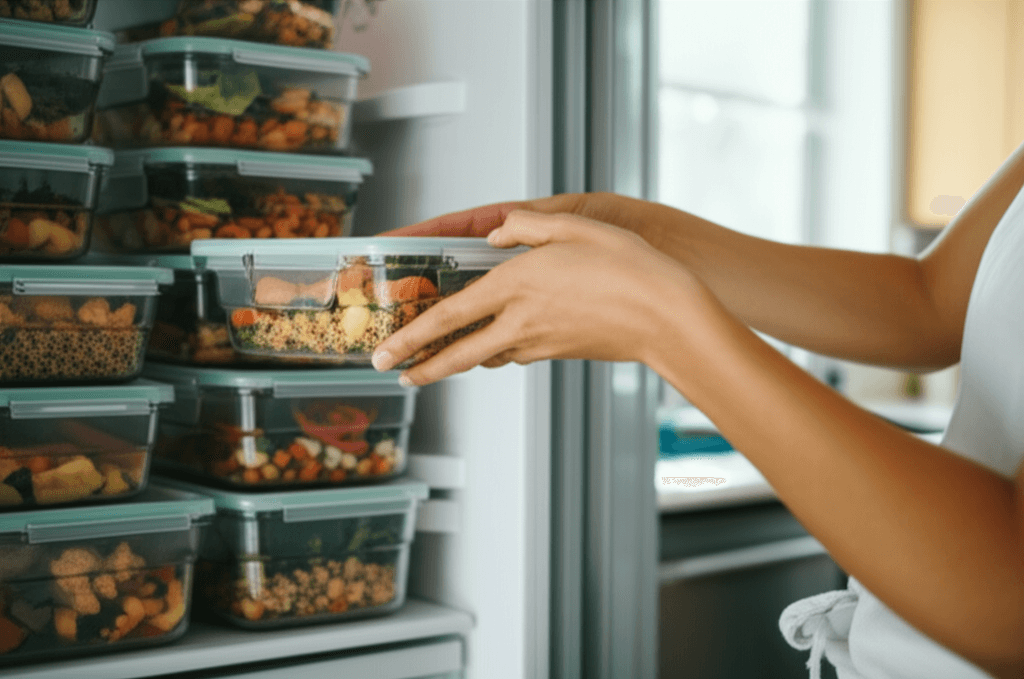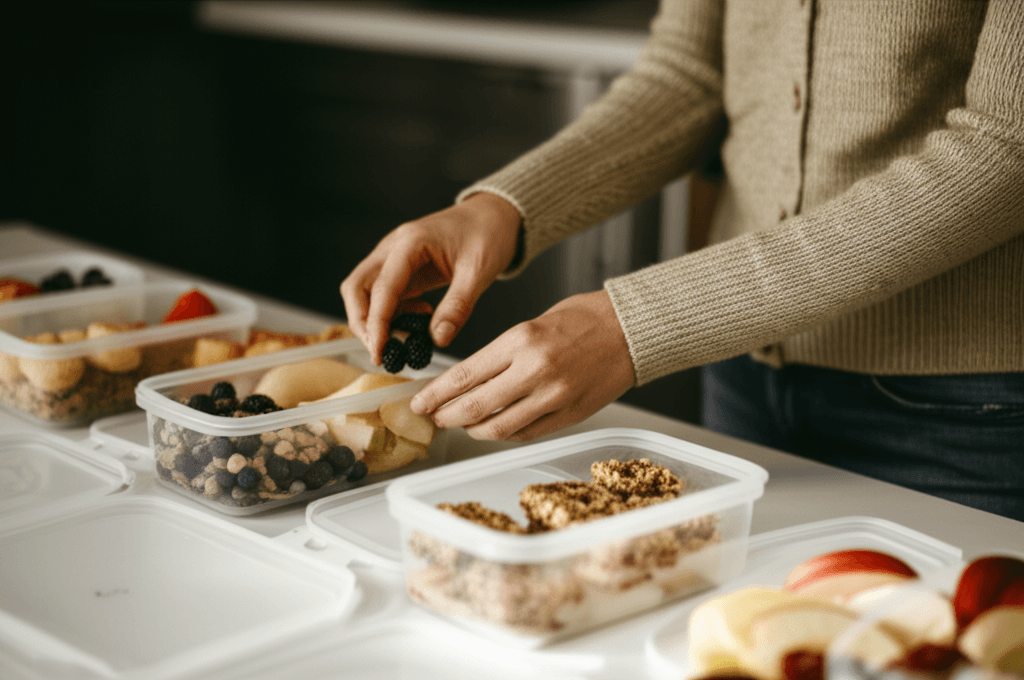In today’s fast-paced world, maintaining healthy eating habits often feels like an impossible task when you’re too busy to even think about food. The allure of quick, convenient, and often highly processed options can derail the best intentions. However, with strategic planning and a few smart fixes, it’s entirely possible to nourish your body effectively, even on the most hectic days. The key lies in proactive choices that minimize decision fatigue and maximize nutritional impact.

1. Master the Art of Strategic Meal Planning and Prep
One of the most impactful ways to ensure healthy eating despite a demanding schedule is to embrace strategic meal planning and preparation. This involves more than just cooking in bulk; it’s about setting yourself up for success throughout the week. Dedicating a few hours on a less busy day, such as a Sunday, can save significant time and mental energy during peak busy periods.
Batch Cooking Staples
Prepare large quantities of versatile, healthy staples that can be mixed and matched into various meals. This could include a batch of cooked whole grains like brown rice or quinoa, roasted vegetables, grilled chicken or baked fish, hard-boiled eggs, or a big pot of vegetable soup or lentil chili. These components are freezer-friendly and can be quickly assembled into diverse meals. Soups, casseroles, and curries are excellent options for batch cooking that freeze well.
Utilize Time-Saving Tools and Ingredients
Modern kitchens offer numerous tools to expedite healthy cooking. Slow cookers and Instant Pots can prepare meals with minimal oversight, allowing you to focus on other tasks while dinner cooks itself. Pre-chopped vegetables, pre-washed greens, canned beans, and frozen fruits and vegetables are convenience items that significantly reduce prep time without compromising nutrition. Deli meats and canned fish can also serve as quick protein sources.
Plan Your Meals in Advance
Creating a simple meal plan for the week, even if it’s just a general idea of breakfasts, lunches, and dinners, can streamline grocery shopping and reduce last-minute unhealthy choices. Meal planning apps can help organize and schedule meals, providing calorie, carb, fat, and protein counts, reducing stress, and generating grocery lists.

2. Stock Up on Smart, Portable Snacks
When hunger strikes between meals, especially during a busy day, having healthy snacks readily available is crucial to prevent reaching for highly processed, low-nutrient options. Smart snacking maintains energy levels, curbs intense hunger, and prevents overeating at subsequent meals.
Non-Perishable Essentials
Keep a stash of non-perishable, nutritious snacks in your desk drawer, car, or bag. Good options include unsalted nuts (like almonds, walnuts, cashews), trail mix (without excessive added sugar), single-serving packs of tuna, applesauce, and low-sugar protein bars. Whole-grain crackers or rice cakes can be paired with nut butter for a balanced snack.
Refrigerated Quick Bites
For access to a fridge, options expand to include baby carrots, celery sticks, bell peppers, snap peas, and grape tomatoes, often paired with hummus or salsa for added flavor and nutrients. Fresh fruits like apples, bananas, oranges, and berries are also excellent grab-and-go choices. Low-fat string cheese or Greek yogurt provide quick protein and calcium.

3. Optimize Quick and Convenience Food Choices
There will be times when cooking is simply not an option, and you need a fast solution. Instead of viewing convenience foods as inherently unhealthy, learn to make smarter choices within these categories.
Navigating Fast Food and Takeout
When ordering fast food, prioritize grilled options over fried, such as a grilled chicken sandwich instead of a fried one or a side salad or fruit instead of fries. Opt for smaller portion sizes and choose water, unsweetened tea, or diet soda instead of sugary drinks. Be mindful of high-fat, high-sodium condiments and sauces, asking for them on the side to control portions. When choosing takeaway, look for options like sashimi, grilled fish with salad, or salad sandwiches.
Smart Supermarket Solutions
The supermarket offers many semi-prepared items that can be part of a healthy meal. Rotisserie chicken can be quickly combined with pre-washed salad kits and a microwaveable whole grain for a balanced meal. Canned or frozen vegetables are convenient additions to any meal, providing essential nutrients without extra chopping time. When selecting packaged foods, check nutrition labels to avoid excessive added sugars, sodium, and unhealthy fats.

4. Prioritize Protein and Fiber for Sustained Energy
When you’re busy, sustained energy is vital to prevent energy crashes and the temptation to reach for sugary fixes. Incorporating adequate protein and fiber into your meals and snacks is a powerful strategy to maintain satiety and stable blood sugar levels.
Protein-Rich Breakfasts
Starting your day with a protein-rich breakfast sets the tone for sustained energy. Instead of sugary cereals or pastries, opt for Greek yogurt with nuts, a protein shake, eggs with vegetables, or even leftovers that include lean protein. A balanced breakfast helps replenish blood sugar stores and staves off mid-morning hunger.
Balancing Macros in Meals
Aim for a combination of fiber, protein, healthy fats, and complex carbohydrates in your meals and snacks. This ensures your body receives the necessary nutrients to function optimally and keeps you feeling full longer. For instance, if having a sandwich, choose whole-grain bread and load it with lean protein and plenty of vegetables. Filling half your plate with vegetables at lunch or dinner can naturally increase fiber intake and reduce reliance on high-carb or high-protein portions.

5. Cultivate Mindful Eating and Prioritize Hydration
Even with the best planning, a busy schedule can lead to mindless eating or neglecting basic hydration. Addressing these habits can significantly improve your overall well-being and eating patterns.
Practice Mindful Eating
When rushed, it’s easy to eat too quickly, leading to overconsumption because your brain doesn’t have time to register fullness. Make a conscious effort to slow down during meals, even if it’s just for 10-15 minutes. Step away from your computer or phone, and pay attention to the taste, smell, appearance, and texture of your food. Responding to hunger cues early can prevent extreme hunger that often leads to poorer food choices.
Stay Adequately Hydrated
Often mistaken for hunger, dehydration can lead to unnecessary snacking and fatigue. Keeping a reusable water bottle handy and consistently refilling it throughout the day is a simple yet effective way to stay hydrated. Adding slices of fruit like lemon or cucumber can make water more appealing. Proper hydration supports digestion, maintains energy levels, and can help reduce hunger.
By integrating these five smart fixes—strategic meal planning and prep, smart snacking, optimizing convenience foods, prioritizing protein and fiber, and practicing mindful eating with adequate hydration—even the busiest individuals can maintain a healthy and nourishing diet without feeling overwhelmed.







